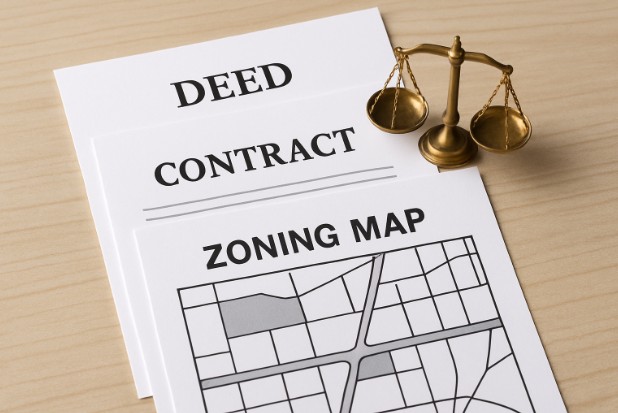How Legal Knowledge Impacts Real Estate Transactions
Real estate transactions are significant financial events that require careful legal expertise to prevent losses, disputes, or missed opportunities. An informed, proactive approach ensures smooth ownership transfers and avoids legal pitfalls, particularly in a market characterized by changing regulations and technological advancements. Staying vigilant helps identify risks, uncover opportunities, and ensure compliance, making legal expertise crucial. New digital tools, such as blockchain and electronic signatures, introduce additional legal considerations, underscoring the importance of current legal knowledge for ensuring safe and secure transactions.
Understanding Legal Frameworks in Real Estate
Each real estate transaction is influenced by a layered set of regulations, ranging from broad federal laws to highly specific local ordinances and common law traditions. These laws determine not only how property is transferred and owned but also what rights attach to land and how disputes are resolved when they arise. For example, a local city council may establish unique zoning rules that affect what can be built. At the same time, state law typically governs the execution of contracts and the disclosures that must be provided before a sale. A solid foundation in these complex legal frameworks is crucial for avoiding costly and time-consuming conflicts that could delay or even derail a transaction. Consulting experienced Robinson & Henry real estate attorneys can help buyers, sellers, and investors navigate these legal nuances effectively. Moreover, it is vital to stay up to date on regulatory updates—including new legislation, recent court decisions, and administrative rulings—so that all parties can anticipate and prepare for potential challenges well in advance.
The broad legal framework that governs real estate can be overwhelming, as it encompasses a wide range of legal documents and regulations. These can include deeds, title insurance, zoning regulations, mandatory disclosure requirements, and various financing arrangements, such as mortgages, liens, and escrow accounts. For instance, local zoning laws might dictate how close you can build to your neighbor, while environmental laws may require assessments or remediation for contaminated sites. Meanwhile, state law might regulate the disclosures that sellers must make about known defects. Due to the dynamic and often complex nature of real estate law, staying informed about rapidly evolving topics—such as the increasing focus on environmental regulation and sustainable development—is an essential part of successful transaction management.

Common Legal Challenges in Property Transactions
Even straightforward real estate transactions can face significant legal challenges, often revealed late in the process. Common issues include undisclosed liens, vague contracts, and zoning violations, all of which can disrupt agreements and lead to financial issues. Undisclosed liens, such as unpaid taxes and unresolved judgments, can obstruct property transfers. Poorly drafted contracts can lead to costly disputes, underscoring the importance of clarity in defining terms and obligations. Additionally, adherence to zoning regulations is crucial; violations can result in fines or the loss of property use. Awareness of these obstacles is key for participants to mitigate risks and protect their investments.
The Role of Legal Professionals in Real Estate
In real estate transactions, the involvement of legal counsel is crucial due to the complex nature of the legal landscape. Real estate attorneys play a multifaceted role, acting not just as document preparers but as proactive risk managers, trusted advisors, and skilled negotiators. Their expertise is essential for interpreting regulatory changes, identifying loopholes in contracts, and resolving disputes among various parties, including agents, developers, and government entities. Their responsibilities include drafting and reviewing contracts to clarify terms and prevent ambiguities that could lead to litigation, conducting due diligence on properties to uncover any risk factors such as lease histories or zoning issues, and representing clients in negotiations or legal settings to protect contractual rights and resolve conflicts.
Impact of Regulatory Changes on Real Estate Transactions
New or revised government regulations can fundamentally shift the entire real estate landscape for buyers, sellers, and professional agents. For example, the U.S. Treasury’s Financial Crimes Enforcement Network (FinCEN) has recently expanded its reporting requirements for all-cash residential transactions involving legal entities or trusts. These new requirements are specifically designed to curb illicit financial activity, prevent real estate from being used for money laundering, and improve transparency throughout the sector. For professionals and investors, especially those working with trusts, LLCs, or out-of-state buyers, awareness of and compliance with such regulatory changes is not only prudent—it is essential to avoiding criminal or civil penalties.
Technological Advancements and Legal Considerations
Modern technology offers both powerful tools and new strategic challenges in the field of real estate law. Innovations such as blockchain are now enabling more secure, tamper-proof records for property titles, deeds, and transfers, greatly reducing the risk of fraud or error. Likewise, artificial intelligence is transforming due diligence and market analysis by providing faster and more comprehensive assessments of property value, rental trends, and legal history. However, these advances also present novel legal risks, including concerns related to data privacy, algorithmic errors, and compliance with both local and national regulations. The increasing adoption of “digital closings” and virtual signing platforms places new legal burdens on parties to ensure cybersecurity, implement robust identity verification protocols, and guarantee the enforceability of electronically executed documents. Staying current on these topics is critical for all stakeholders.
Best Practices for Ensuring Legal Compliance
Thorough due diligence is paramount in real estate transactions, requiring a comprehensive investigation into all aspects of a property’s background. This includes scrutinizing ownership history, existing liens, and verifying compliance with zoning and environmental regulations to circumvent potential last-minute surprises. Partnering with real estate experts is highly recommended; engaging attorneys who specialize in local and state real estate law can provide invaluable guidance throughout the various stages of a transaction, from contract review to the final closing process. Additionally, it is crucial to monitor legislative developments continuously. Keeping informed about evolving state, local, and federal regulatory changes can significantly impact the specific transaction or type of property involved. Finally, the smart use of technology can enhance convenience and efficiency in handling transactions; however, it is crucial to evaluate the legal implications of each digital tool employed. Implementing safeguards to protect sensitive data and transaction records is crucial in mitigating the risks associated with the use of technology in real estate transactions.
Conclusion
Comprehensive legal knowledge empowers buyers, sellers, and investors to navigate real estate transactions with confidence and clarity. By remaining informed and working closely with skilled professionals, the risks inherent in property transfers can be minimized. The evolving nature of regulations and technology only underscores the value of expert legal insight in this dynamic market.







